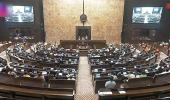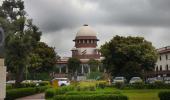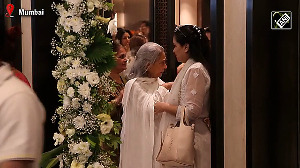The Jamiat Ulama-i-Hind has filed a petition in the Supreme Court challenging the constitutional validity of the Waqf (Amendment) Act, 2025, claiming it was a "dangerous conspiracy" to strip Muslims of their religious freedom.

President Droupadi Murmu on Saturday gave her assent to the Waqf (Amendment) Bill, 2025, which was earlier passed by Parliament after heated debates in both Houses.
Several petitions, including one by Samastha Kerala Jamiathul Ulema, have been filed in the apex court challenging the validity of the Act.
In its petition, the Jamiat Ulama-i-Hind has said that this law was a "direct attack on the country's Constitution, which not only provides equal rights to its citizens but also grants them complete religious freedom".
"This bill is a dangerous conspiracy to strip Muslims of their religious freedom. Therefore, we have challenged the Waqf (Amendment) Act, 2025, in the Supreme Court, and the state units of Jamiat Ulama-i-Hind will also challenge the constitutional validity of this law in the high courts of their respective states," the Jamiat said in a press release.
"President of Jamiat Ulama-i-Hind, Maulana Arshad Madani, has not only challenged various provisions of the Waqf (Amendment) Act but has also filed an interim petition in court to prevent the law from coming into effect," it said.
In its separate plea filed in the top court, Samastha Kerala Jamiathul Ulema, a religious organisation of Sunni Muslim scholars and clerics in Kerala, has claimed the Act was a "blatant intrusion" into the rights of a religious denomination to manage its own affairs in the matter of religion.
The plea, filed through advocate Zulfiker Ali PS, said these amendments would distort the religious character of Waqfs while also irreversibly damaging the democratic process in the administration of Waqf and Waqf Boards.
"Hence, it is submitted that the 2025 Act is a blatant intrusion into the rights of a religious denomination to manage its own affairs in the matter of religion which is protected under Article 26 of the Constitution of India," the plea said.
It alleged that the 2025 Act was against the federal principles of Constitution as it takes away all powers of the state governments and State Waqf Boards in connection with Waqfs and accumulates all powers into the hands of the Central government.
"The cumulative effect of these provisions will be highly detrimental to Waqfs at large and the Muslim community will be deprived of large tract of Waqf properties on account of operation of these provisions," the plea said.
Several pleas, including those by Congress MP Mohammad Jawed, AIMIM president Asaduddin Owaisi and AAP MLA Amanatullah Khan, were filed in the top court challenging the validity of the bill.
Besides them, an NGO -- Association for the Protection of Civil Rights -- has also filed a petition in the apex court challenging the constitutional validity of the Waqf (Amendment) Bill, 2025.
Jawed's plea alleged the bill imposed "arbitrary restrictions" on Waqf properties and their management, undermining the Muslim community's religious autonomy.
The petition, filed through advocate Anas Tanwir, said the proposed law discriminated against the Muslim community by "imposing restrictions that are not present in the governance of other religious endowments".
The bill was passed in the Rajya Sabha with 128 members voting in favour and 95 opposing it. It was passed in the Lok Sabha with 288 members supporting it and 232 against it.
Lok Sabha member from Bihar's Kishanganj Jawed, who was a member of the Joint Parliamentary Committee on the bill, has alleged in his plea that the bill "introduces restrictions on the creation of Waqfs based on the duration of one's religious practice".
In his separate plea, Owaisi said the bill takes away from Waqfs various protection which are accorded to Waqfs and Hindus, Jain and Sikh religious and charitable endowments alike.
"This diminishing of the protection given to Waqfs while retaining them for religious and charitable endowments of other religions constitutes hostile discrimination against Muslims and is violative of Articles 14 and 15 of the Constitution, which prohibit discrimination on the grounds of religion," said Owaisi's plea, filed by advocate Lzafeer Ahmad.
The plea argued the amendments "irreversibly dilute" the statutory protection afforded to Waqfs and their regulatory framework while giving "undue advantage" to other stakeholders and interest groups, undermining years of progress and pushing back Waqf management by several decades.
In his separate plea, Amanatullah Khan has sought that the Waqf (Amendment) Bill be declared as "unconstitutional and being violative of Articles 14, 15, 21, 25, 26, 29, 30 and 300-A of the Constitution".
'Challenging Waqf (Amendment) Bill in SC will yield no results'
Asserting the Waqf (Amendment) Bill has been brought in the interest of poor and marginalised Muslims, Union minister BL Verma on Sunday said challenging it in the Supreme Court will yield no results.
Verma defended the bill, stating that it had received overwhelming support in Parliament and reflected the strength of the Narendra Modi government.
"The Waqf (Amendment) Bill has been passed with a strong majority. Some people may approach the Supreme Court against it, but nothing is going to happen," he said at a press conference at the party office here on the occasion of the BJP's Foundation Day.
Verma emphasised the bill is meant to benefit weaker sections within the Muslim community, particularly the poor and Pasmanda Muslims.
"This legislation will ensure transparency and accountability in the management of Waqf properties and ultimately work in the interest of underprivileged Muslims," he added.
Verma's remarks come amid reports of some Muslim organizations and opposition leaders planning to legally challenge the provisions of the amended bill.










 © 2025
© 2025